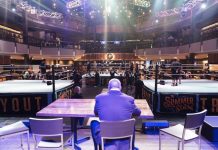The NWA’s Billy Corgan recently did an interview with Sam Roberts. Here are the highlights:
TNA trying to be too much like WWE:
“You know, I would have these discussions with Dixie Carter in particular and John Gaburick. Let’s call it the ‘In the Shadow of WWE’ problem. TNA was forever in the shadow of WWE, so me as being part of creative and I was allegedly an executive, I would make these arguments like, ‘Why can’t we present these programs in a different way? Why do we have to be WWE-lite?’
‘Well, if people don’t see the pyro or they don’t see this or that, they don’t think it’s legitimate.’ And I would say things like, ‘Yeah, but I’ve been to a lot of concerts where there was no production and it was a great concert.’ Or, ‘I’ve been to plays where obviously they’d spent nothing on the sets, but I was engaged with the narrative. Why can’t we try to break this thing down and rebuild it some other direction. So when people look at our product’ — in this case, it was TNA — ‘they go, Oh, there’s something different happening here.’
You take people on a different journey. That comes from being a DIY musician who came out of the end of the punk alternative goth scene, or whatever. They just could not wrap their heads around it. Like, ‘If it doesn’t look big, therefore it’s not big.’ And I kept saying, ‘But we don’t have that kind of production budget, so people unconsciously are recognizing that you’re the B program.’”
His philosophy with the NWA:
“So in essence, here’s the thing on paper. If we present a world-class roster, you know, wrestling balls-out to the best of their ability in a longer style PPV match type of setting. In a hot house setting with only 350 people in the building, in a small room. Will that create something that you on the other end as a consumer, Sam, will go, ‘I’m enjoying this because it’s giving me sort of a different feeling.
Yeah, duh, it’s not WrestleMania. But it’s different and it’s cool because it’s this. Those are bets that most people are not willing to make in the marketplace, because they find safety in commonality. Where my entire artistic life has been, I don’t find any safety in commonality. Every time I’ve ever stood in the line that everyone else has stood in, they told me, ‘You’re not this enough. Your teeth are crooked,’ or whatever.
You know what I mean? Like, ‘If you want to be in this world, you need to be more like everyone else.’ So my whole philosophy was generated like, ‘Well, if you’re going to kick me out of your little world, I’m just gonna do it my way.’ And so it’ll be interesting whether our way will translate. And the feedback post-PPV will be like, ‘Okay, that’s a worthy endeavor’ or we’ll look at each other and say, ‘That was a good effort, and now we know we’re going to have to run more of a traditional PPV model because it just doesn’t translate as a bigger feel.”







